The Coaching & Resources for Entrepreneurial Women (CREW) program encourages early-career women in science to become entrepreneurs, in part by reimagining what that means.
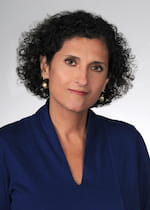
The program, founded in 2022, is led by Carol Feghali-Bostwick, Ph.D., the Kitty Trask Holt Endowed Chair for Scleroderma Research. Feghali-Bostwick is an entrepreneur herself, having identified an anti-fibrotic peptide that has been licensed by a company. She experienced firsthand the challenges women entrepreneurs face.
"When I started on my entrepreneurship journey, I felt I was entering a black box. I had no training or background to guide me through the process," said Feghali-Bostwick. "The CREW program is designed to overcome this gap in knowledge for women. It leverages a unique combination of mentoring and professional coaching, which renders the mentoring more effective and positively impacts the participants professionally and personally."
"When I started on my entrepreneurship journey, I felt I was entering a black box. I had no training or background to guide me through the process. The CREW program is designed to overcome this gap in knowledge for women."-- Dr. Carol Feghali-Bostwick
One of the goals of the program is to build women's confidence so that they can be successful entrepreneurs while remaining true to their own values.
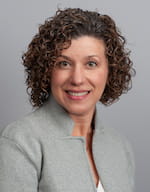
"Don't be afraid of the word entrepreneur," coaching expert and researcher Angela Passarelli, Ph.D., advises those who are considering applying for the program, which is currently accepting applications.
"When we think of a leader, the implicit prototype is often male, reflected in the saying: think leader, think male. This is true of entrepreneurs as well, which can create barriers for women, who do not wish to be identified with generalized prototypes," said Passarelli, an associate professor of practice in the Fuqua School of Business at Duke University, who heads up the coaching component of the CREW program. "We encourage our participants to be willing to define what it means to be entrepreneurs for themselves."
"We encourage our participants to be willing to define what it means to be entrepreneurs for themselves."-- Dr. Angela Passarelli
Other members of the CREW leadership team include chief innovation officer Jesse Goodwin, Ph.D.; chief science officer Tammy Loucks, DrPH, of the South Carolina Clinical & Translational Research (SCTR) Institute; and SCTR evaluation director Jillian Harvey, Ph.D.
Come as you are
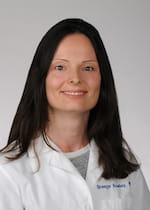
The program, designed for postdoctoral fellows and early-career faculty, encourages applicants at all stages of the entrepreneurial journey and strives to cultivate in them the intellectual focus and emotional and social resources they will need to succeed.
When cancer researcher Breege Howley, Ph.D., applied to CREW, she had an idea for a small molecule inhibitor for triple-negative breast cancer but had only barely begun to develop the project. Howley didn't know much about how products are patented and commercialized and wanted to learn more so that she could advance a much-needed therapeutic to the clinic for this extremely aggressive cancer.
Physician-scientist Yosra Alkabab, M.D., joked that she was at "stage zero" when she applied to the CREW program. She had been involved with tuberculosis research as a fellow at the University of Virginia but did not come up with her idea for an app to monitor therapeutic drug levels in tuberculosis patients, until her participation in CREW. She hopes her app will be used in areas with widespread TB, reducing the time to diagnosis and improving patient outcomes.
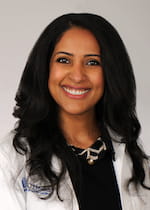
When sleep researcher Allison Wilkerson, Ph.D., applied to CREW, she was further along with her project than many, having both created a website to train providers on cognitive behavioral therapy for insomnia and founded a company to develop and expand the project further. She knew that she would need to grow her company to accommodate other digital health solutions in the pipeline. But she didn't know the best practices for doing so, feared the time demands it could bring and felt overwhelmed at the idea of hiring staff.
One size does not fit all
The CREW program offers this diverse array of participants a combination of coursework, mentorship and individualized professional coaching to help them to reach their goals.
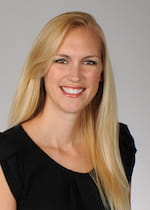
As physicians and scientists, most participants are new to the world of intellectual property protection, patents and startups. The entrepreneurship course offered by the College of Graduate Studies provides an intensive introduction to these concepts and offers a certificate for completion. Participants also develop business plans and pitch their ideas to attendees of MUSC's Innovation Week.
The program places an extremely high value on mentoring by others with entrepreneurial experience as well as professional coaching tailored to the needs of the individual to build personal resilience and leadership skills.
Mentoring by seasoned entrepreneurs
Amanda Giles, OTD, associate professor in the College of Health Professions, is a mentor in the program and an entrepreneur herself, leading a company that develops educational technologies for students in health professions worldwide. Giles is impressed by the extent and diversity of the entrepreneurial experience the mentors bring to the program.
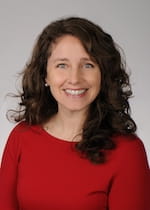
These women and men have developed their own products and grown their own businesses," she said. "They have the lived experience that enables them to provide realistic and meaningful advice."
Howley certainly appreciated that lived experience. "I think that it makes a big difference when you have the perspective of female entrepreneurs and the challenges and hurdles they had to go through to get to where they are," she said.
To combat the self-doubt that can derail entrepreneurs in the early stages of developing their innovations, the program focuses on tearing down the internal barriers that can impede progress.
"We often just need to overcome the personal barriers that inhibit us from doing that next step," said Giles. "The biggest wins for our group are watching people tear down those walls and move forward."
"We often just need to overcome the personal barriers that inhibit us from doing that next step. The biggest wins for our group are watching people tear down those walls and move forward."-- Dr. Amanda Giles
Instead of meeting one on one with mentors, a small group of mentees meets with a small group of mentors monthly to discuss topics of interest, including how to negotiate for funding, how to choose between several good ideas, how to balance your role in the University and as a business owner and when and how to hire employees.
Mentors and mentees alike have reported that they appreciate the diversity of perspectives they receive from these small group sessions.
"I think that it makes a big difference when you have the perspective of female entrepreneurs and the challenges and hurdles they had to go through to get to where they are."-- Dr. Breege Howley
"I love that mentors bring very different experiences and opinions into the room," said Giles. "I don't feel like I can meet all the needs of every person in the room, and it's really nice that for whatever question a mentee brings forward, one of the mentors in the room likely has a really good answer."
Alkabab and Wilkerson are grateful for the mentoring they received in the program.
"My mentor group worked with me to identify my strengths and areas for improvement, providing tailored advice that was directly applicable to my project," said Alkabab. "This personalized attention significantly boosted my entrepreneurial skills and confidence."
Wilkerson echoed her positive sentiments. "The mentors provided months of encouragement and guidance on how to hire good people who will be a good fit for my company," she said.
Building lifelong networks
Howley values the connections that the program has allowed her to make. "The program has been an excellent platform to expand my research network because it's put me in contact with other academic entrepreneurs both at MUSC and the other institutes. And, having that network in place has really helped my confidence as an entrepreneur," she said.
Passarelli believes that those connections should be lifelong.
"I would hope that this is a group of people that we will keep together for many years to come, as a resource throughout their career and not just for the time they were participants," she said.
Personalized professional coaching
In addition to mentorship, CREW offers participants individualized and group sessions with professional certified coaches. Unlike mentorship, where mentors delve into their own experiences to advise mentees, coaching puts the focus on the mentees.
"Coaching puts women in the driver's seat of their own development by leveraging their autonomy and building their competence," said Passarelli.
"Coaching puts women in the driver's seat of their own development by leveraging their autonomy and building their competence."-- Dr. Angela Passarelli
Coaches help participants to explore their values and motivations and how they are reflected in their projects.
"The coaching framed entrepreneurship within the context of my broader personal values and goals," said Alkabab. "It wasn't just about teaching me how to be an entrepreneur but also about aligning entrepreneurial activities with my commitment to global health and social impact. This alignment was essential in ensuring that my project stayed true to my core values and mission as a physician-scientist."
"The coach asked what I wanted to focus on, and we dug in, and so that was really empowering. And, more importantly, that was really efficient as a working mom of three."-- Dr. Allison Wilkerson
Participants were able to tailor their coaching sessions according to their needs.
"The coach asked what I wanted to focus on, and we dug in, and so that was really empowering. And, more importantly, that was really efficient as a working mom of three," said Wilkerson.
Alkabab was surprised at how profound the coaching relationship turned out to be.
"Over time, my relationship with my coach evolved into a dynamic partnership where I felt comfortable seeking advice on a range of issues, from strategic decisions to personal challenges to pursuing other mentors outside of tuberculosis research," she said. "This evolution made the coaching experience profoundly impactful on both professional and personal levels."
"Over time, my relationship with my coach evolved into a dynamic partnership where I felt comfortable seeking advice on a range of issues. This evolution made the coaching experience profoundly impactful on both professional and personal levels."-- Dr. Yosra Alkabab
Group coaching sessions focused on topics such as emotional intelligence, self-promotion, work-life balance and team leadership. These sessions helped to build the confidence of participants, many of whom were struggling with self-doubt, a telltale symptom of the imposter syndrome.
Passarelli thinks that coaching is one of the "secret sauces" of the program because it enables women to change in the context of relationships with others.
"Coaching is particularly powerful for women because women tend to grow in connection with others, and so part of the power of coaching is that the very human relationship between the coach and the participant is really the driver of change," she said.
It's all about the impact
In the end, for many of the participants, becoming an entrepreneur is a way to amplify their impact.
"The program has provided me with really great feedback and support, and translating my technology to combat triple-negative breast cancer and get it to the clinic feels like a more attainable goal right now, whereas when I started off, I wasn't sure what I was doing," said Howley.
Wilkerson expanded the scope of her training app from the original targeted patient population to all those struggling with insomnia.
"My original goal was not to let the online educational program I developed around insomnia die," said Wilkerson. "I've moved from that to a mindset where I am confident that it could really thrive and flourish as its own entity and provide both provider-facing and patient-facing websites and apps."
"The CREW program offered a unique blend of lectures and personalized coaching that enhanced my ability to drive meaningful change in my daily career and also in global health through entrepreneurial strategies."-- Dr. Yosra Alkabab
Alkabab learned how to begin to realize her vision of improving TB outcomes worldwide.
"The CREW program offered a unique blend of lectures and personalized coaching that enhanced my ability to drive meaningful change in my daily career and also in global health through entrepreneurial strategies," she said.
Giles summed up the participants' potential for impact.
"You can step into entrepreneurship as an educator, researcher, or clinician and maintain that part of your identity while still promoting your product into the world to help more people than just those around you," said Giles.
For Further information on how to apply to the CREW program, visit the program's web page.
messa






